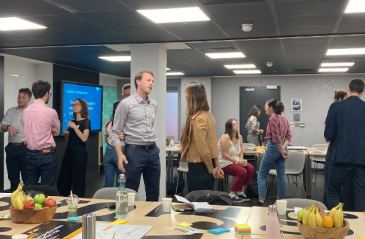
Embracing AI: Empowering vulnerable workers for a more inclusive future

The process after Article 50 looks even harder than what preceded it, says @NadineMCSmith
Share articleWith the UK as divided now as it was last June, uniting the country is easier said than done
Share articleThe UK govt needs to genuinely engage with voters as it maps the next steps, says @NadineMCSmith
Share articleWe put our vision for government into practice through learning partner projects that align with our values and help reimagine government so that it works for everyone.
I am writing this from the Eurostar train - it is taking me from London to Paris in little under three hours. It took six years and thousands of workers to dig the tunnel under the English Channel to finally connect the island that is Great Britain to mainland Europe. The moment it opened represented a new Britain - one that was inclusive, open and signaled an ever closer union with EU member states.
As I leave the UK, Theresa May has just triggered Article 50 - a technocratic term to describe the official notice that a country must give to the EU to signal it is leaving. After 44 years as an EU member, the UK has got through one referendum, a Supreme Court challenge, a tricky path through the House of Lords and one of the hottest public debates in decades - and it continues. May's letter triggering Article 50 was easy enough to get to Brussels - thanks to the Eurostar - but the process leading to it was not and the process ahead looks even harder.
Today's Daily Mail screams the word 'FREEDOM' on its front page - an ironic reminder of the Scottish hero William Wallace (aka Braveheart) when he faced his worst enemy, The English, and also death, to fight for Scotland's freedom.
But today, Scotland's future is as uncertain as England's. I doubt they feel free. We went into a referendum together and we leave together. However Scotland didn't decide to leave (only 38% voted that way). Now their leader, Nicola Sturgeon, is asking for a second referendum she won't get yet - so once again major uncertainty leaves a whole nation hanging. Today, neither she, her supporters nor the 48% of the UK population who voted to remain will be shouting freedom. Today the only certain fact is that we don't know what is coming next, nor how we will be engaged with about our future.
Listening to people today many feel, including myself, they were not given information about what Brexit meant. Some believed it meant we would still enjoy many of the benefits of the EU without actually being in it. Some admit they would change their vote today, some who voted to remain say they feel a mixture of emotions, some have even decided to leave the UK altogether. The country is as divided today as it was on referendum day last June 23rd.
So Mrs May is expecting a lot when she asks for us all to unite. If after two years, no deal is struck, then we leave with no deal. For many, this is not a situation to feel comfortable with. Business and people alike want conversation, openness and debate and to meet that deadline feeling as if they played a part in their future.
Two things could happen next.
The first option is that the UK government spends the next two years working behind closed doors, keen to ensure their negotiating position will not be revealed in public. They, with selected business leaders and 'experts' tell us what they are concerned about, become the commentators and the people's voice. The second option is that the UK government engages in an open two-way communication, with genuine engagement about what is being proposed and why.
The second is by far the hardest but perhaps the most necessary. At the Centre for Public Impact, building legitimacy is one of the three Public Impact Fundamentals. Legitimacy is about trust, engagement and political commitment. Policy and action are the other two fundamentals - and government feels far more comfortable there. Our case studies have proven, however, that without legitimacy even the best ideas have a higher likelihood of failing. Legitimacy has to be built through engagement that is genuine, open and honest - not only with the experts but with people whose lives are affected, in this case most of us. Just like any divorce, it may get messy before it gets better but as a result, the outcome will be better.
It is apt that I am on my way to an OECD meeting on integrity and trust. And as I approach Gare du Nord, I wonder whether this journey will even be possible in such quick time in the future. As I breeze through immigration with my EU passport I know that even these little but significant privileges have had huge consequences on our lives and our perception of diversity. Immigration remains one of the perhaps most unsolvable sticking points of all in this - it was one of the top reasons why people voted to leave the EU yet there is little to suggest those concerns will be resolved.
There is so much to still be said, to do and to understand - 19,000 or so statutory instruments to think through to be precise, but more to the point nearly 65million lives to take care of and unite.
This is not a job that can be done with just a few.












